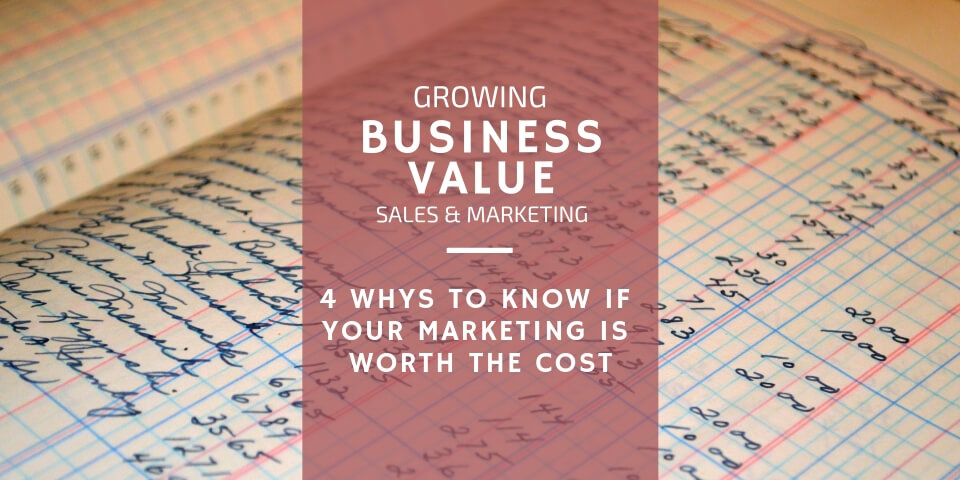
Business Owners Lose Objectivity About the Value of Their Businesses
February 12, 2019
Peer to Peer Lending: An Alternative Source for Loans
February 14, 2019Marketing – A Waste of Money or Essential for Growth?

Many times, entrepreneurs don’t see an immediate value or immediate return on their marketing investments. Therefore, they think marketing’s “not worth it.” Yet, their short-sighted view can lead to long-term loss of revenue. So just how do you know if marketing works? And does marketing matter when it comes to growing the value of your company?
Podcast Time Index for “Is Marketing Worth It?”
- 00:45 – Is Marketing worth it?
- 01:08 – The Parable of the Hotdog Vendor
- 04:18 – Is it worth it?
- 06:20 – How do You Know if Marketing works?
- 07:38 – Create a Marketing Budget based on the Goals set out
- 12:29 – Monitor and Measure
- 16:19 – Detail the Allocation
- 17:55 – Prospect Qualification
- 19:20 – A Major Missing Aspect in many Marketing Plans
- 21:12 – Summary
A Marketing Success and Failure
To illustrate a point about marketing, I want to tell you a story I’ve heard about a hot dog vendor who operated a mobile cart in a major metropolitan city in New Jersey. Every morning, Mark would get up and go to his spot, and everybody knew this spot because the interstate was just above him. You see, he’d purchased strategic billboard advertising right before the off-ramp of that interstate that said, “Greatest hot dogs here” with an arrow pointing to his spot. Inevitably, each day when Mark arrived at his spot, he would find patrons waiting to purchase his delicious hot dogs.
Well, as the story goes, Mark’s business continued to maintain and grow. Then, the Recession of 2009 happened. Nonetheless, he was still selling hot dogs because people have to eat, even if they’re out of work, and hot dogs are a fairly low-cost meal. But one day, a gentleman asked Mark, “Sir, how in the world is your business booming? We’re in the greatest recession of modern times!” Having no idea the country was in a recession, Mark didn’t give much thought to the man’s question at that moment.
However, later that night, he turned on the news and saw all the doom and gloom about the recession. Fearful of what that meant for his business, Mark decided that he needed to cut back and do what he could to save money. Thus, he quit paying for his billboard advertising. Before long, patrons weren’t lined up when he got to his spot. Loyal customers who knew he was there continued frequenting his business for a time, but eventually, he lost his robust sales, and his business folded.
4 Ways to Know if Marketing Works
Although Mark’s story may be simplistic to prove a point, it illustrates the vital role marketing plays within a small business. Real-world examples are not this obvious – how do you know whether or not YOUR marketing works? Well, let me give you some insight into that. To determine if marketing is working in your small business, you can do the following things:
#1 Create a marketing budget based on the goals you’ve set during your strategic planning sessions.
Exactly how much money you spend on your marketing budget is a hotly debated topic. However, the Small Business Administration recommends that businesses spend about 7-8% of their gross revenue on marketing. Yet, the SBA also says that growing companies should spend between 12 and 20%, and established companies should spend between 6 and 12%. I personally believe the more you can allocate toward marketing, the better.
#2 Monitor and measure your early marketing strategies.
Do A/B testing with similar advertising campaigns to decide which will work better for your business. Determine which yields more traffic into your store or eyeballs on your site by tagging your actions. For example, create a phone number through Google Voice so you can track leads that come in from a certain advertising source. Or, use QR codes or custom URLs to determine which advertising elements are bringing the most customers to you.
#3 Create a detailed monetary allocation.
After you create an overarching marketing budget and then do some A/B testing to see which advertising avenues will work best for you, it’s time to create a detailed allocation for how you will spend your advertising dollars. Realize that you will likely have high front-end costs to get your marketing going in the right direction. Maybe you have to pay significant fees to a website developer or to a marketing company. But after those up-front costs, you’ll want to know how and where you’ll be spending your dollars allocated for monthly marketing and advertising.
#4 Quantify the results.
Finally, you’re going to quantify your marketing results. You’ll track URLs, calls, sales, QR codes, etc to see if the dollars you’re spending are worth the results you’re getting. Essentially, you’re trying to determine your marketing cost per lead, per sale, or per customer you attained. Then, you’ll look to see if your sales increased to give you an exponential return on your acquisitions.
Why Marketing’s Worth the Investment
So why is it that small business owners think marketing is not worth the investment? It’s because we are jacks of all trades in our businesses. They’re trying to be everything to their businesses and fill every role in their businesses. Yet, they eventually realize that the systems they need aren’t effective. They don’t have the SEO knowledge or the marketing knowledge they need to create and track marketing campaigns.
Yet, if you’re trying to increase the value of your company to sell it for profit or to attract investors down the road, you will need to be able to show how you’ve reached the success you’ve reached. A marketing budget and a marketing plan will help you drive up the intangible value of your company because you can show investors or buyers exactly what you’ve done. You can show potential buyers what campaigns you’ve done or not done and what advertising venues you’ve used or not used. Then, you quantify the results of your dollars spent so that you can show potential buyers what worked or what didn’t work. Everything will be together to show that you are a best-in-class company.
Be sure to continue in our Business Growth series as we delve into your employees and other team members… picking and motivating.




